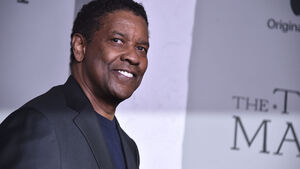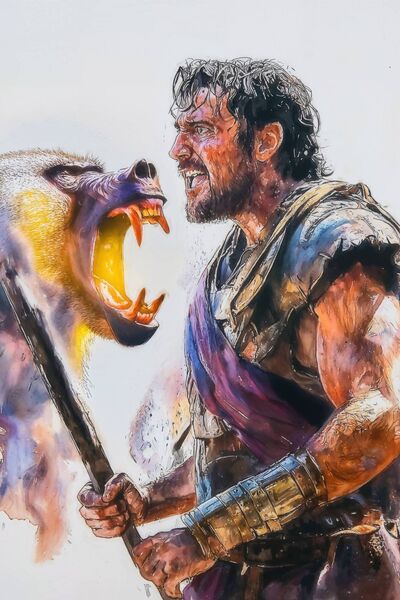The glories of Rome are better left in the past

Denzel Washington provides the only real spark of life. Picture: Jordan Strauss/Invision/AP
After months of waiting and expectation, the long-awaited sequel to arrived at my local cinema. I was characteristically early, too early, enduring the 20 minutes of adverts by gorging on my supply of popcorn and coke. The opening credits were clever, a digitally altered reprise of the original classic characters and most memorable scenes. Twenty minutes into the screening, I wished I'd left it there, the following hour-plus offering no relief from the monotony of CGI overkill and a woefully limp script.
The fundamental flaw presented itself in the first ten minutes, sifting through the sorry epic like a parching desert wind. I felt zero emotional connection to any of the characters while simultaneously denied the catharsis of loathing a convincing villain.
There's something sadly tragic about watching a master filmmaker desperately trying to recreate past glories, like an ageing gladiator attempting one last bout in the arena. Ridley Scott's arrives with all the subtlety of a rhinoceros in a Roman bathhouse and about as much grace. The whole endeavour feels like watching someone attempt to recreate the Sistine Chapel using finger paints and boundless optimism.
The original was a magnificent beast that roared with purpose - Russell Crowe's Maximus carried the weight of Rome's destiny in his piercing gaze and smouldering unpredictability. Paul Mescal's Lucius, by comparison, appears to be carrying nothing weightier than the self-conscious awkwardness of a man freshly minted from the narcissistic buffing of a strenuous workout routine. He stalks through scenes with the haunted look of someone who's just remembered they left the chariot running, devoid of any hint of redeeming humour. Not Mescal's fault, director Ridley Scott seems to have forgotten that even the most dire human circumstance can be leavened by wit.
The CGI spectacle descends into what can only be described as a historical fantasy football, complete with computer-generated baboons that have wandered in from a different film entirely - possibly one directed by a caffeinated 12-year-old with access to their parent's editing software. Real baboons are terrifying enough; why lose all credibility with baboons from the shadows of ?
When a gladiator astride a CGI rhinoceros appeared, I wondered if Scott had accidentally ingested some of Emperor Caracalla's more exotic medicinal supplies. The digital menagerie grows so outlandish that one half expects a T-Rex to lumber into the frame, perhaps wearing a toga for historical accuracy.
Denzel Washington provides the only real spark of life, prowling through scenes like a leopard in a chicken coop, clearly having tremendous fun while everyone else appears to be auditioning for a particularly dour production of . His performance as Macrinus manages to be both deliciously ham and perfectly cured, as if he alone sees through the risible script. Washington seems to understand what the rest of the cast has forgotten - that even tales of revenge and empire should occasionally tickle as well as stab. But given all that, he is not villainous enough to elicit even a modicum of loathing.
The twin emperors (Joseph Quinn and Fred Hechinger) giggle and twitch their way through proceedings like boarding school prefects who've discovered their father's wine cellar, though their attempted menace falls woefully short of Joaquin Phoenix's masterclass in imperial madness from the original. They're less "terror of Rome" and more "terrible at Rome". They might as well be rejects from an audition to Rue Paul's Drag race, hitting the free bar in half costume and before turning on each other in full bitch mode.

Scott has always been a director who could make mud look magnificent, but here he's given us a Rome that appears to have been pressure-washed for tourist season. The pristine marble and carefully arranged decay suggest less "decline and fall" and more "historical theme park after hours". Every column gleams with spotless perfection, making one suspect the film's most oversized budget item might have been Roman Febreze.
The plot, such as it is, follows the original's blueprint with all the creativity of a bureaucrat copying last year's reports. It's as if someone fed the first film's script into ChatGPT and asked it to "make it bigger but with more animals". The result is a predictable and preposterous narrative, the writer getting everything wrong but with absolute confidence. Mescal gives a bravura performance, but his meteoric rise from stinking slave to the glorious saviour of Rome beggars belief from even the most suspended reasoning.
The battle scenes, once Scott's forte, now feel like watching someone play a particularly expensive video game while refusing to share the controller. The camera swoops and dives through digital armies with all the restraint of a sugar-rushed child playing with action figures. There's spectacle aplenty, but it's empty calories - Rome's equivalent of fast food served on marble platters. I longed for some accomplished acting facilitated by a sizzling script. I waited in vain.
Speaking of platters, let's discuss the film's attempts at political commentary, which feel about as substantial as a leaf of lettuce at a Roman feast. The original gave us a meditation on power, duty, and revenge. This sequel offers vague mumblings about democracy that sound suspiciously like they were cribbed from a student's history presentation. It's as if someone tried to turn 'The Decline and Fall of the Roman Empire' into a Twitter thread.
The dialogue ranges from the merely pedestrian to the actively painful. Characters don't so much deliver lines as they drop them like hot coals, eager to move on to the next CGI-enhanced set piece. At times, it feels less like watching ancient Rome and more like witnessing a costly historical reenactment society that's gotten carried away with its budget. Lucius' pivotal meeting with his mother is so painfully inept, the dialogue so stilted that I can almost hear a side of ham being carved with relish, a more emotively flaccid reunion of estranged mother and son could not be imagined.
In one particularly telling scene, a character gravely intones: "Rome is diseased." Indeed, it is - with a particularly virulent strain of sequelitis. The symptoms include chronic nostalgia, acute CGI inflammation, and a severe deficiency of original ideas. One might prescribe a good script doctor, but I fear the patient is terminal.
The film's treatment of historical accuracy is about as faithful as a Roman senator during a coup. Anachronisms abound with the enthusiasm of tourists at a toga party. The Rome of feels less like the capital of an empire and more like a Vegas casino's idea of what ancient Rome might have looked like after a few too many cocktails.
The film's greatest sin isn't that it's terrible - it's that it's terribly unnecessary. Like Rome itself, the original wasn't built in a day, but this sequel feels like it was conceived over an exceptionally long and boozy lunch. It stands in relation to its predecessor the way a plastic Colosseum snow globe stands to the real thing - a tiny, trivial souvenir of past glory.
Watching is like attending a reunion where everyone's trying desperately to recreate the magic of their glory days, but the magic's gone flat, like week-old wine in a golden cup. It's all the emperor's new clothes and no emperor. The film struts and frets its hours upon the screen, trumpeting into oblivion any hope of intimacy between the characters and the permanently overwhelmed viewer. It's full of sound and fury, terrified to alter the pace lest we spy the hollow pretence at its core.
One can't help but feel a twinge of sympathy for the talented cast, trapped in this gilded cage of mediocrity like exotic birds in a Roman aviary. They do their best with what they're given, but it wouldn't pass muster in a provincial amphitheatre, let alone the Colosseum of a modest Mayo cinema.
Exasperated, I was left with the curious spectacle of a film that simultaneously tries too hard and not nearly hard enough where it truly mattered. It's like watching someone attempt to recreate a perfect cake using only a microwave and boundless optimism. The result may rise, but it's empty at its core. Are we not entertained? Well, possibly, but more in the way one is entertained by watching a drunk uncle attempt karaoke than by witnessing actual greatness.
Perhaps the most damning thing one can say about is that it makes you question whether its predecessor was as good as you remember. It's the cinematic equivalent of meeting your childhood hero and discovering they've become a timeshare salesman in Majorca. Some things, like the glory of Rome, are better left in the past. The best tonic I have self-prescribed is to rewatch the original and develop selective amnesia.





